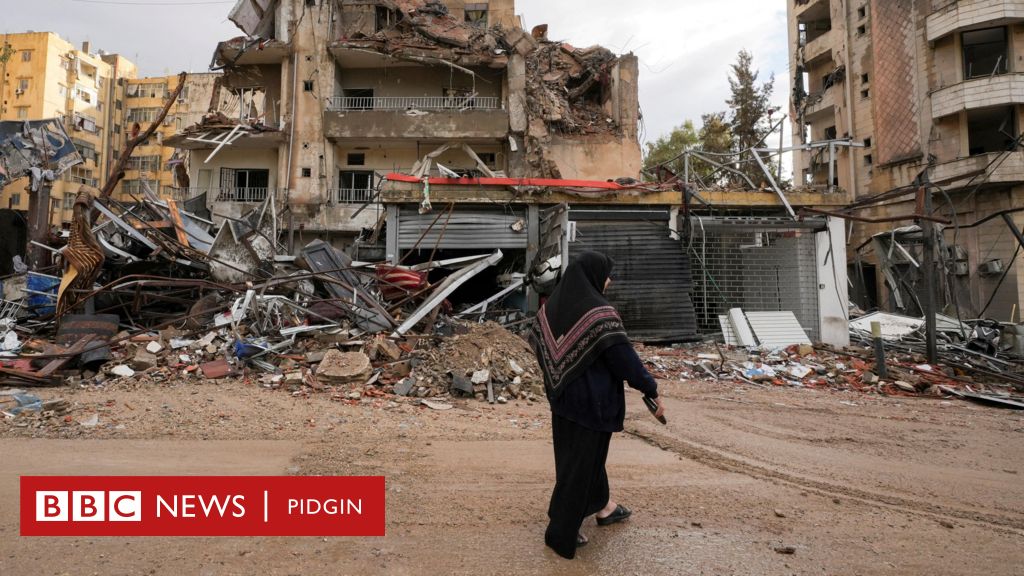Wia dis foto come from, Reuters
US President Joe Biden don announce one ceasefire deal to end 13 months of fighting between Israel and with Hezbollah, di Lebanese militia wey dey supported by Iran.
Inside joint statement, US and France say di agreement go stop fighting for Lebanon and “secure Israel from di threat of Hezbollah and oda terrorist organisations”.
Dis na wetin we know about di ceasefire deal from official briefings and media reports.
Di ceasefire suppose to dey permanent
US President Joe Biden tell reporters say di agreement dey “designed to be a permanent ceasefire”.
Under di agreement of di ceasefire, for over 60 days Hezbollah go remove im fighters and weapons from di area between di Blue Line – wey be di unofficial border between Lebanon and Israel – and di Litani river, about 30km (20 miles) to di north.
Hezbollah fighters go dey replaced by Lebanese army forces for dat area, wey go ensure say infrastructure or weapons dey removed and say dem no fit rebuild am, according to one senior US official.
Over di same 60 days, Israel go gradually withdraw im remaining forces and civilians, Biden tok, adding say e go allow civilians on both sides of di border to return to dia homes.

5,000 Lebanese troops go replace Hezbollah
Di Lebanese army dey expected to deploy 5,000 troops to di south under di agreement, according to one US official.
However, questions remain about dia role in enforcing di ceasefire, and whether dem go face Hezbollah if needed, wey go get di potential to worsen tensions inside kontri wia divisions dey well well.
Di Lebanese army also don say dem no get di resources – money, manpower and equipment – to fulfil dia obligations under di deal, although dat one fit dey sorted by contributions from some of Lebanon international ‘friends’.
But many Western officials say Hezbollah don dey weakened and say dis na di moment for Lebanese government to re-establish control over all di kontri territory.

Wia dis foto come from, Reuters
Who go monitor di ceasefire implementation?
Di agreement go dey mostly tracked by di UN Security Council resolution 1701, wey end di 2006 war between Israel and Hezbollah.
Under resolution 1701, areas for south of di Litani suppose dey free of any armed personnel or weapons oda dan those of di Lebanese state and di UN peacekeeping force (Unifil).
But both sides claim say di resolution don dey violated.
Israel say Hezbollah go allow di building of ogbonge infrastructure for di area, while Lebanon say Israel violations include military flights over im territory.
Dis time, US and France go join di existing tripartite mechanism, wey involve Unifil, Lebanon and Israel, wey dem go give di responsibility of monitoring violations, di senior US official tok.
“US combat troops no go dey for di area, but military support go dey for di Lebanese Armed Forces, as we done do in di past. But in dis case, e go happen with di Lebanese army and in collabo with di French military as well,” di official tok.
Biden tok about Israel concerns say: “dem no go allow di rebuilding of Hezbollah terrorist infrastructure for southern Lebanon.”
Israel dey claim right to respond to violations
Prime Minister Netanyahu say Israel go “maintain full freedom of military action” for Lebanon “with United States’ full understanding”.
“If Hezbollah violate di agreement and try to arm inself, we go attack. If dem try to rebuild terrorist infrastructure near di border, we go attack. If dem launch rocket, if dem dig tunnel, if dem bring in truck carrying rockets, we go attack,” e tok.
Biden support dat view, e tell reporters: “If Hezbollah or anyone else break di deal and pose direct threat to Israel, den Israel get di right to self-defence wey dey consistent with international law.”
But e also say di deal uphold Lebanon sovereignty.
Di Israeli demand for di right to strike back no dey believed to be part of di ceasefire agreement because e bin dey rejected by Lebanon. For dis issue, media reports don suggest say US go issue letter wey support Israel right to act.

